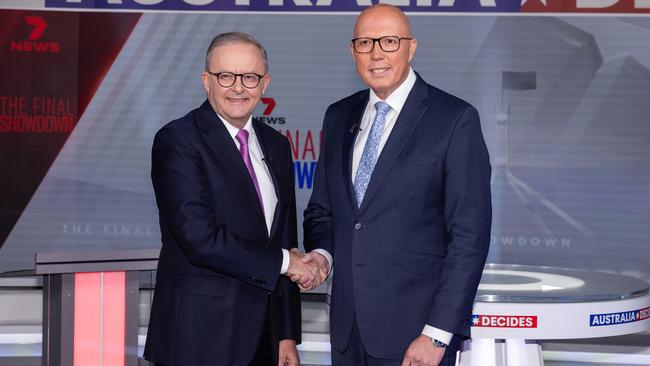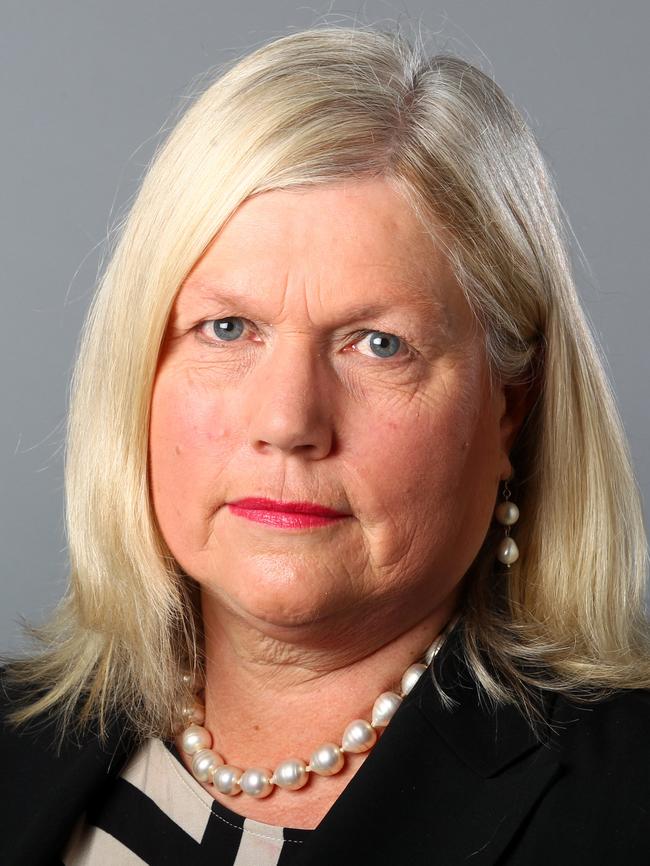Election 2025: Experts’ verdicts: Who won Anthony Albanese and Peter Dutton’s fourth debate
Sheridan, Kenny, Bramston, Trinca, Sloan and Benson analyse the performances of Anthony Albanese and Peter Dutton in the fourth and final leaders debate of the election campaign.

Anthony Albanese and Peter Dutton have faced off in the fourth and final leaders debate of the 2025 election campaign. Our experts deliver their verdicts.
Greg Sheridan

Peter Dutton was the clear but fairly narrow winner of the Seven debate, but it’s hard to believe that it would significantly affect how anybody votes. Indeed just staying with the debate for the whole hour was a triumph of endurance.
God bless any committed democrat in TV land who stuck with the whole debate. They deserve a Citizen Hero medal.
Dutton was the more aggressive, but within the Mogadon-style stupor of the whole enterprise, not aggressive enough to offend anyone.
The first half of this debate was astonishingly bad. The metronomic recital of predigested talking points left no cliche unturned, banality piled upon banality. It had a weirdly hypnotic effect, a kind of somnambulistic, potent sleep-inducing power.
People, hospital administrators in particular, should record this debate. If you want a non-chemical sedative, if you ever run out of Temazepam, you could play this debate on loop.
On the other hand, if you stayed awake during the process, it could be a foretaste of eternal damnation.
Both leaders, though endlessly rehearsed on talking points, have a terrible tendency to speak in “inside baseball” Canberra jargon, leaving phrases unfinished, referring to issues and events by their Canberra insider code words.
Seven added its own ingredients of aesthetic degradation, a weirdly swelling music score towards the end of every answer being acutely annoying, distracting as well as demeaning.
Mark Riley, the host, seemed to think he was running for office as well. He admonished Dutton for talking about what gets taught in our schools.
We argued endlessly about the black armband view of history in the Howard years and we need to move beyond that, Riley said, imitating a statement of papal infallibility.
Apparently it doesn’t matter what the political leaders think, nor indeed what the voters think, Seven can tell you what’s important and what’s not.
There were times when Riley seemed to be one of the debaters. He would then declare himself the winner of the exchange. That’s television making its own contribution to the rubbishing of Australia’s political culture.
The debate got a little more lively in the second half.
Dutton went more strongly on the attack and seemed comfortable on cultural issues.
He also nominated, with proper qualifications and context, the Communist Party of China as the single greatest threat to Australia. Anthony Albanese sensibly didn’t contradict Dutton on this. That’s a kind of advance, minimal but modestly worthwhile.
Generally, these debates have been very poor quality and entirely in keeping with a very poor quality campaign. The Seven debate was perhaps the worst. Because each debate traverses all over again all the issues, over and over again, everything is superficial, repetitive and pretty tedious.
As befits the guy running behind, Dutton was the more aggressive performer in this debate and therefore seemed to land more blows. Although Albanese landed his share as well.
Generally Albanese, protecting a narrow lead, was trying to play mistake-free football.
Frankly, neither leader looked impressive, but the format certainly didn’t help them.
Chris Kenny

This was a terrific contest and Peter Dutton clearly won, pushing Anthony Albanese further onto the back foot than any other time during the campaign. The Prime Minister almost fell off the back of the stage again.
It started turgidly enough but then sprang to life when Dutton broke from the script and, seemingly, the format, to directly attack Albanese for breaking promises and creating an “economic mess”. That is the core argument for the Coalition.
To be fair, Albanese’s response was quite strong, although light-on for evidence. Dutton came back even stronger – “you can’t stand here telling people they’re better off after three years”.
Dutton proffered Labor’s scare campaign as proof of the government’s inability to stand on its record. Albanese was reduced to claiming Dutton was “talking Australia down”.
With temperatures raised, the debate moved on to Welcomes to Country, and Dutton said they were “overused” in a way that “cheapens” the objective. Albanese, on some of his weakest ground after the voice referendum disaster, wobbled, refusing to agree the welcomes are overdone and saying it is up to others to make those choices.
Suddenly moderator Mark Riley was asking Albanese whether he still believed in the voice. Albanese, to paraphrase another Labor prime minister, was a shiver looking for a spine, obfuscating and saying only that he respected the referendum outcome.
Next it was the US relationship and Donald Trump, and Albanese tried to suggest Trump would not have a mobile phone. Trump is the most prolific and direct user of social media and direct call-ins to radio and television that global politics has ever known, and yet to deflect from his lack of phone contact with the US President, Albanese said he would not have a cell phone – I cannot wait to hear Trump’s response.
On energy Dutton pushed hard again, attacking Labor’s renewables plan and the limited scope of battery storage. Let’s hope this fires up the final week of what has been a lacklustre campaign where Labor is in front, but the Coalition is close enough to at least force them into minority.
Troy Bramston

The two leaders have their key lines memorised and policies announced. This meant both Anthony Albanese and Peter Dutton were on message with only a few stumbles. It was disappointing not seeing something new, although it was spirited at times. No surprise two million voters have had enough and already cast their ballots.
I rate this debate as a draw, after two wins for Albanese and one win for Dutton. The Prime Minister had good recall of facts and figures, and got across messages about certainty, cost-of-living relief and longer-term policies.
The Opposition Leader interrupted and attacked more, which can be a turn-off for voters, but some critiques of the government were effective. However, Dutton didn’t communicate enough of his vision and policies, which was essential after multiple backflips.
I must mention the Seven broadcast. It looked like a game show. The word association with images and sound bites was silly. The swelling music as the clock wound down is more suited to the Academy Awards. It was annoying and trivialised the debate.
Helen Trinca

What a surprise – four weeks in and a nation suffering from fact fatigue, and yet the final debate ended up being the liveliest yet, thanks to the introduction of the culture wars; a bizarre argument about Donald Trump’s mobile phone; a verbal biff over nuclear; and some seriously gimmicky questions at the end.
This debate also saw the leaders – old hands at this now – give their best performances. It was a dead heat, with both of them a little outflanked by a relaxed and on-point moderator in Mark Riley who starred as a third presence. Riley started conventionally enough with the mandatory questions on costs of living and housing and tax. Nothing to see here as the leaders went into automatic pilot with predictable answers.
Then, from left field, a Welcome to Country question that proved a gift for the Leader of the Opposition who has a clear position – it’s “overdone”. The Prime Minister looked a little less sure, declined to say yes or no, and came up with an answer unlikely to satisfy advocates or opponents of the Indigenous welcome.
The ad break provided a chance to regroup for some quick “show and tell” from Riley and co-host Natalie Barr. Everything from the price of eggs to the Prime Minister’s coastal home plus some old audio got a guernsey here. The journos looked a little sheepish at the start but the trick worked a treat with the leaders loosening up and opting for some direct interchanges that kept us all awake. On a Sunday night at the tail end of a long campaign after three pretty standard-issue debates, hats off to Seven for playing with the format.
The most important material – in terms of the politics of this final week – was the interaction over Welcome to Country in a campaign which has avoided any interest at all in Indigenous policy or big cultural issues. Quite what voters will make of it remains to be seen.
Judith Sloan

The final leaders debate was not unlike watching a dead rubber in an early round of the Davis Cup. It’s hard to believe that many viewers spent an hour of their valuable time listening to the Prime Minister and Leader of the Opposition repeat points they have already made. This particularly applies to the many people who have already voted.
As it turned out, the format was reasonably slick and entertaining. The responses of both leaders were deliberately kept brief and there was not too much talking over each other. All the main issues were covered, including a discussion of what might be termed the culture wars and the role of Welcome to Country addresses.
There was also some coverage of national security with Peter Dutton prepared to name China as our major geostrategic threat. Anthony Albanese opted for a fudged response, declaring that soft diplomacy is his forte. This said, the Coalition’s last-minute announcement on extra defence spending has come too late and with insufficient detail.
Sadly, the election campaign has mainly been about “what’s in it for me”, a theme that sits easily with Labor’s spending predilection. There has been far too little about the national interest and what should be done to achieve prosperity in the longer term.
Both leaders performed creditably, although Dutton was in better form on the night. He has clearly become accustomed to Albanese’s twisting of the facts and his overreliance on criticising past policies of the Coalition. There are times when Albanese effectively acts as though he is opposition leader, focusing on what he perceives as the weaknesses of the Coalition rather than emphasising the record of his government.
As leader of the government, however, Albanese can point to cost-of-living measures undertaken and proposed which have obvious attraction for struggling voters. It’s a harder road for Dutton to convince voters that a change in government will make them better off. I give it to Dutton on the night but am unconvinced that this final debate will significantly move the election dial. It will be worth watching Victoria where the Labor state government is so on the nose that the Coalition should pick up several seats. It’s less clear where the Coalition can make other gains.
Simon Benson

Peter Dutton made the salient point. And Anthony Albanese couldn’t disagree. Under three years of Labor government, Australians have gone backwards.
There is no argument about this.
For the Liberal leader, this was the only point he needed to make.
He needed to remind voters of how badly they have had it. Everything else was largely irrelevant.
The issue is the question over which leader would be the great reliever.
In the final debate of the campaign, the Liberal leader destroyed the prime minister’s renewables only energy proposition.
His argument that Labor has destroyed aspiration resonated.
He failed to assure the Coalition would address it.
Sadly for the Liberal leader, this argument this critical issue was quickly consumed by a host-inspired culture war argument over Welcome to Country.
This was a debate that quickly devolved from the primary cost-of-living issues to arguments about anything else.
No one that witnesses it would be more enlightened.
Neither leader made a mistake, neither dominated.
This was the final of four leaders debates of the campaign. It was the only one to be conducted after a significant number of voters had already had cast their vote.
And it was a completely pointless exercise. This debate was too little, too late and will make no difference.

To join the conversation, please log in. Don't have an account? Register
Join the conversation, you are commenting as Logout